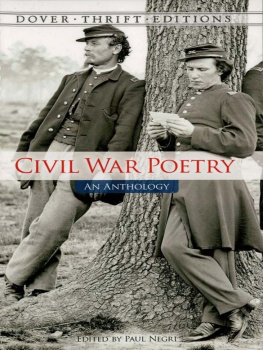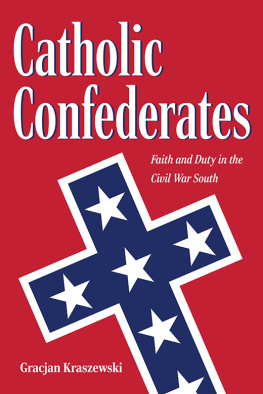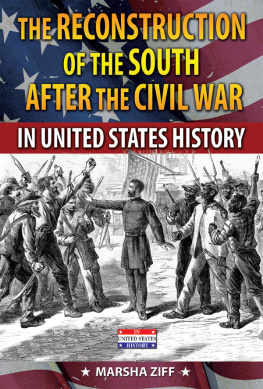THE
ENIGMATIC
SOUTH
THE
ENIGMATIC
SOUTH
TOWARD CIVIL WAR
AND ITS LEGACIES
EDITED BY
SAMUEL C. HYDE, JR.
WITH A FOREWORD BY
JAMES M. MCPHERSON
AND AN AFTERWORD BY
GAINES M. FOSTER
 LOUISIANA STATE UNIVERSITY PRESS
LOUISIANA STATE UNIVERSITY PRESS
BATON ROUGEPUBLISHED WITH THE ASSISTANCE OF THE V. RAY CARDOZIER FUND
Published by Louisiana State University Press
Copyright 2014 by Louisiana State University Press
All rights reserved
Manufactured in the United States of America
FIRST PRINTING
DESIGNER: Mandy McDonald Scallan
TYPEFACE: Whitman
PRINTER AND BINDER: Maple Press, Inc.
Library of Congress Cataloging-in-Publication Data
The enigmatic South : toward Civil War and its legacies / edited by Samuel C. Hyde Jr. ; with a foreword by James M. McPherson and an afterword by Gaines M. Foster.
pages cm
ISBN 978-0-8071-5694-0 (cloth : alkaline paper) ISBN 978-0-8071-5695-7 (pdf) ISBN 978-0-8071-5696-4 (mobi) ISBN 978-0-8071-5697-1 (epub) 1. Southern StatesCivilization 17751865. 2. Southern StatesHistory17751865. 3. Southern StatesSocial conditions19th century. 4. SlaverySouthern StatesHistory. 5. SecessionSouthern States. I. Hyde, Samuel C., 1958
F213.E535 2015
975'03dc23
2014011364
The paper in this book meets the guidelines for permanence and durability of the Committee on Production Guidelines for Book Longevity of the Council on Library Resources.

CONTENTS
FOREWORD
James M. McPherson
PART I
Politics, Education, and Secession
CHAPTER ONE
The Old Republican Constitutional Primer: States Rights After the
Missouri Controversy and the Onset of the Politics of Slavery
Christopher Childers
CHAPTER TWO
Punctuated Progress: Education Developments
in the Antebellum Gulf South
Sarah L. Hyde
CHAPTER THREE
Preaching Disunion: Clergymen in the Louisiana Secession Crisis
Julia Huston Nguyen
PART II
The Diverse Challenges of War
CHAPTER FOUR
Confederate Dilemmas: The Strange Case of Clement L. Vallandigham
George C. Rable
CHAPTER FIVE
Rich Mans Fight: Wealth, Privilege, and Military Service
in Confederate Mississippi
Paul F. Paskoff
CHAPTER SIX
Searching for Some Plain and Simple Method: Jefferson Davis
and Confederate Conscription
John M. Sacher
PART III
The Legacy of War and Its Memory
CHAPTER SEVEN
Old South, New South: The Strange Career of Pierre Champomier
Richard Follett
CHAPTER EIGHT
Continuity Recast: Judge Edward McGehee, Wilkinson County,
and the Saga of Bowling Green Plantation
Samuel C. Hyde, Jr.
CHAPTER NINE
A Monument of Paper for William Lowndes Yancey: Crafting
and Obscuring Historical Memory
Eric H. Walther
AFTERWORD
Contingency and Continuity: William J. Cooper Jr., an Appreciation
Gaines M. Foster
FOREWORD
James M. McPherson
This collection of essays offers a fitting tribute to Bill Coopers career spanning nearly half a century as scholar, teacher, and mentor. Written by former students plus a colleague at Louisiana State University, these articles deal with many of the same themes that Bills books and essays focused on: the politics of slavery in the antebellum South; education and intellectual life in the region; problems faced by Jefferson Davis and the Confederacy during the Civil War; class structure and the degree of social cohesion in the Old and New South; and the question of continuity versus discontinuity in the South across the great divide of the Civil War.
Chris Childers shows how the Missouri Compromise debate shocked southerners into an awareness of northern hostility to slavery, which produced in turn a preoccupation with creating a bulwark of state rights and national political power to defend the institution. Southern churches and clergy became part of that defense, as demonstrated by Julia Huston Nguyen, who depicts the important role prominent preachers played in supporting secession to preserve slavery from the perceived threat posed by Lincolns election. Sarah Hyde convincingly challenges the stereotype of educational backwardness in the antebellum South but also hints at the way in which the intensifying conflict over slaverys expansion weakened southern Whigs and their support for expanded public education in the 1840s and 1850s.
Jefferson Davis believed that the Confederacy could win its independence only through victory on the battlefield, which could be achieved by a full mo-bilization of the Souths manpower and resources. Although Davis failed to explain fully to the southern people the need for conscription as a key element of mobilization, John Sacher maintains that the Confederate president did a reasonably good job of overseeing that controversial policy, which brought an extraordinary proportion of the eligible population into the army. And in spite of apparent class discrimination in the application of the draftexemplified by substitution, the Twenty-Negro law, and certain occupational exemptionsPaul Paskoffs findings confirm other recent research showing that at least as large a proportion of men from the slaveholding class served in the armed forces as those from poorer classes; it was not disproportionately a poor mans fight. How much help the Confederacy might expect from northern antiwar Copperheads like Clement Vallandigham presented southern leaders with a dilemma, as delineated by George Rable. Vallandighams opposition to the war had the potential to divide the northern people, which could have benefited the South, but he also professed to support the goal of preserving the Union. Thus, to Jefferson Davis and other southern leaders, faith in Vallandigham as an ally represented a will-o-the-wisp for the cause of Confederate independence.
Was the Old South a seigniorial society based on the premodern institution of slavery or a capitalist society featuring modernizing tendencies? Richard Follett analyzes this question with respect to Louisianas capital-intensive sugar plantations and concludes that they combined elements of premodern and modern social and economic relations, which persisted into the postwar era. Focusing on the case study of a wealthy cotton planter in Mississippi, Samuel Hyde comes to a similar conclusion. His study of Edward McGehee suggests that the answer to the much-debated question of the degree of continuity or discontinuity between the Old and New South is not an either-or proposition; the Civil War marked a sharp change in many respects, abolishing slavery and the plantation economy, but sometimes it seemed as if the more things changed the more they stayed the same. That was certainly the purpose of the progenitors of the Lost Cause crusade in the postwar South, of which John Witherspoon Du Boses hagiographic biography of William Lowndes Yancey was a conspicuous part. Eric Walther skillfully makes the case that Du Bose consciously sought to use this biography as an opportunity to perpetuate that civilization for the preservation of which the Confederacy was formed.










